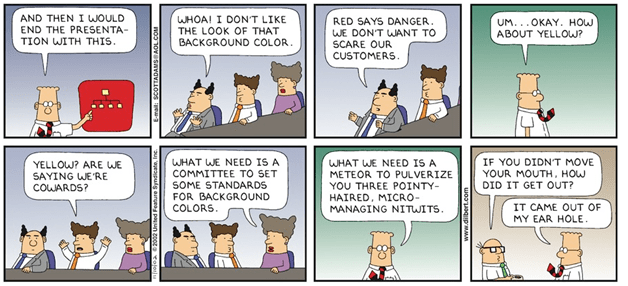We’ve all had experiences around the office space that mirror the experiences portrayed in a Dilbert comic strip. Created by Scott Adams while working with telecommunications engineers at a national bank, the strip was first published in 1989, and has since become a loveable satire of the daily lives many of us share.
In fact, the comic strips are typically so on-point that they offer us a guide on how not to run our businesses. If you want to keep your own office from mimicking a Dilbert strip, follow these five points below:
-
Plan for Productive Meetings
According to a 2011 study, the average worker is interrupted for a total of 91 minutes during their workday. On top of interruptions from co-workers, check-ups from managers, emails and phone calls, offices also face interruptions stemming from unwarranted meetings.
If you’ve ever found yourself in a meeting to plan another meeting, you likely understand how frivolous get-togethers can derail your entire day. In order to conquer unguided or unnecessary meetings, make it a requirement for those requesting a meeting with you to provide an agenda beforehand so you can determine if attending is in your best interest. And if you’re the one leading the meeting, be sure to actually follow the agenda in order to keep the productivity flowing.
In the world of Dilbert, each character can be caught using catchy buzzwords as a way to sound smart without really saying anything at all. The key to good communication is having everyone on the same page, but despite what you may think, sometimes buzzwords get in the way of effective conversation.
While they can be helpful to flash around in an office environment from time to time, buzzwords are sometimes overused to the point where they lose all meaning, making it difficult for productive conversations to take place within the office. When sitting down at your next meeting, be conscious of how frequently you use words like “synergy”, “cloud”, “strategic communication”, “streamline”, “viral”, “bandwidth”, “exit strategy”, “diversity” and “alignment” and how the people you are speaking with receive those words.
-
Let Other People Do Their Job
The old saying “if you want something done right, do it yourself” doesn’t really have much bearing in a team environment. When you work on a team, each member serves as an integral part of a well-oiled machine. Given that everyone has a specialty that makes them unique, it’s important that each team member is trusted to use their abilities to help the team get further than a single employee could.
That being said, no one is privy to all of the right answers—that’s where your co-workers come into play. Each team member should want to contribute in a way that benefits the team as a whole. If you’re having trouble finding the right word to use in a report, need a second set of eyes, or are looking to accomplishing a task that requires more hands and skills than the ones you currently possess, leverage your co-workers!
-
Stay Away from Micromanagement
No one likes having a manager hover over their shoulder constantly nitpicking at their work. When managing your employees on a project or task, ask yourself whether or not you’re paying too much attention to the way they’re going about their work. Oftentimes, it can be difficult to learn how to leverage out important tasks, but it’s rarely the case that everyone is better off when those tasks are handed off and micromanaged to completion.
If you find that you’re micromanaging your employees, try to take a step back. By allowing your employees a certain level of autonomy, they can learn to figure out best practices on their own and may find a way to plus certain tasks. This will keep your employees engaged in their work, and boost their satisfaction!
-
Help Employees Chase Dreams, Not Coffee
Coffee is great, but it shouldn’t be the only thing your employees find special about your office. If you find your workers looking forward to sitting around and waiting for the coffee pot to fill up instead of engaging themselves in their work, it might be time to shake things up a bit.
Think about how you may be able to open up new opportunities for your employees that meet their personal ambitions will help get them excited about their work. Remember, everyone likes working toward something. By enabling them to see a path in the workplace that helps them work toward accomplishing their goals, you’ll be creating a fun, interactive work-environment.
If you have any tips on how to keep a Dilbert type atmosphere from taking over your office, share them in the comments below or on our Facebook and Twitter pages!





